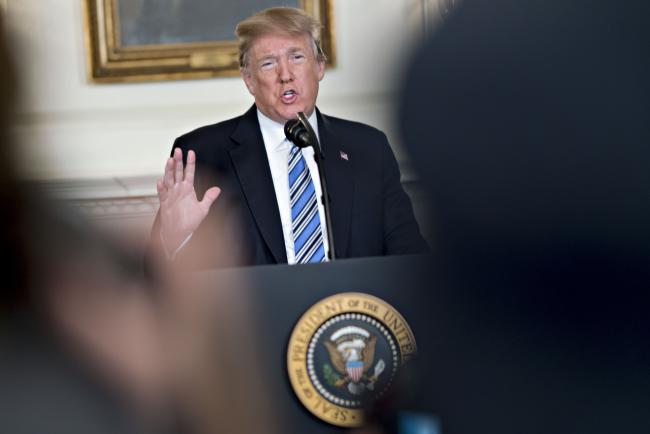(Bloomberg) -- President Donald Trump is warning the U.S. will use “all available tools” to prevent China’s state-driven economic model from undermining global competition, the latest warning to Beijing as America readies a host of trade actions.
China hasn’t lived up to the promises of economic reforms it made when it joined the World Trade Organization in 2001, and actually appears to be moving further away from “market principles” in recent years, according to the president’s annual report to Congress on his trade-policy agenda. China’s “statist” policies are causing a “dramatic misallocation” of global resources that is leaving all countries poorer than they should be, said the report.
Chinese President Xi Jinping has dispatched one of his top economic advisers, Liu He, this week to Washington to meet with senior administration officials amid signs of growing tension between the world’s two biggest economies.
“China is free to pursue whatever trade policy it prefers. But the United States, as a sovereign nation, is free to respond,” according to the report, which is prepared by the U.S. Trade Representative’s office.
Xi has called for countries to avoid protectionism and stick to the current path of globalization. At the same time, Chinese officials are weighing raising tariffs on U.S. soybeans as tensions escalate.
Steel, Aluminum
Trump’s warning comes as his administration considers a range of actions either directly aimed at China, or that could impact the Asian power. The president is weighing several options for curbing imports of steel and aluminum, and Trump has told confidants he’s considering a global tariff on steel of 24 percent, the most punitive alternative recommended by his officials. The administration is ready to act unilaterally if necessary to fight unfair trading practices, according to trade report.
Meanwhile, Trump’s top trade negotiator, Robert Lighthizer, is investigating whether China is flouting U.S. intellectual-property rights. “If necessary, we will take action under section 301 to prevent China from obtaining the benefit of this type of unfair practice,” the report said Wednesday, referring to the legal section under which Lighthizer is doing the probe.
The report boasts that Trump has launched a “new era” of U.S. trade policy focused on ensuring the nation’s “economic independence.” It calls for a return to principles laid out by George Washington, including a focus on the national interest and a view that trade deals should be temporary.
Foreign Markets
Trump’s trade agenda is “driven by a pragmatic determination to use the leverage available to the world’s largest economy to open foreign markets, obtain more efficient global markets and fairer treatment for American workers,” the report said.
U.S. negotiators are discussing changes to the North American Free Trade Agreement this week with their Mexican and Canadian counterparts. Trump has threatened to withdraw from the trade agreement if America’s partners don’t accept proposals aimed at reducing the U.S. trade deficit.
While acknowledging that Nafta has helped American farmers and ranchers, the report reiterates Trump’s contention that the pact has failed too many Americans, costing jobs in the manufacturing sector. The U.S. remains focused on modernizing the agreement and adding provisions that “rebalance” trade flows with Mexico and Canada, according to the 359-page report.
It says the administration “has not simply sought to eliminate Nafta but has made great efforts to alleviate uncertainty for those Americans who rely on it.”
The report didn’t give a clear hint which way the president is leaning on steel and aluminum restrictions. Last year, Trump ordered the Commerce Department to probe whether imports are harming national security, under the seldom-used Section 232 of the 1962 Trade Expansion Act. Commerce concluded foreign shipments are harming security, and gave Trump a range of options. The annual trade report notes Trump may also choose to take no action. He has until mid-April to make a decision.
